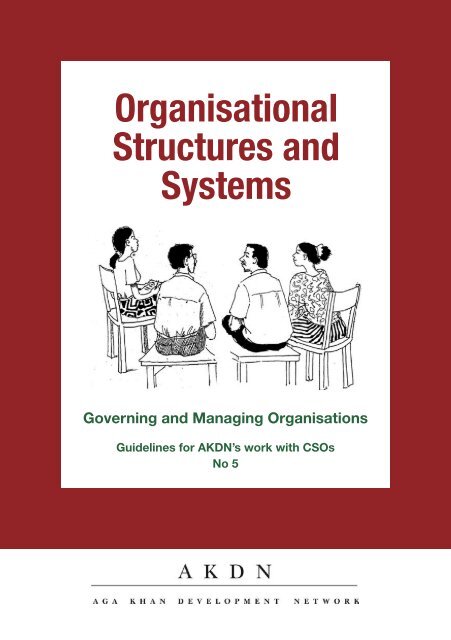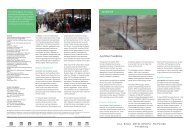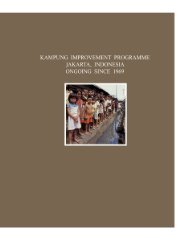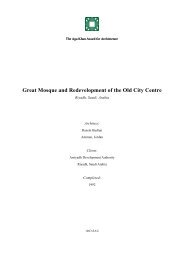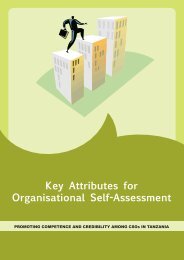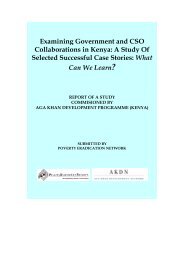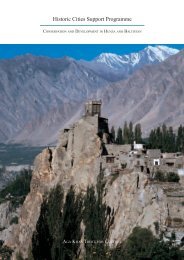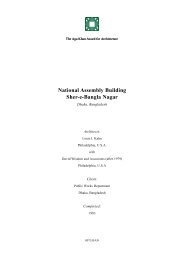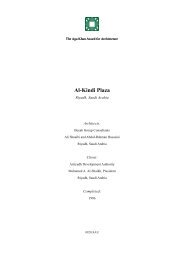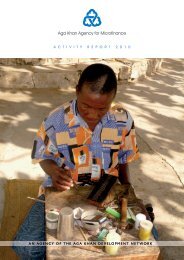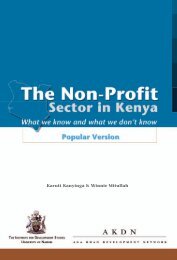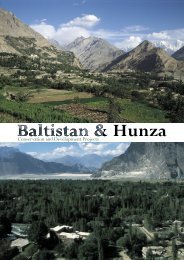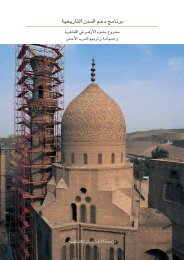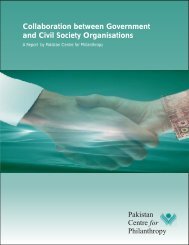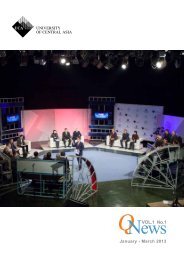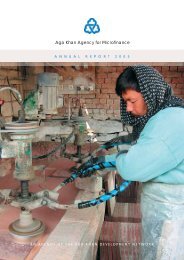Organisational Structures and Systems - Aga Khan Development ...
Organisational Structures and Systems - Aga Khan Development ...
Organisational Structures and Systems - Aga Khan Development ...
Create successful ePaper yourself
Turn your PDF publications into a flip-book with our unique Google optimized e-Paper software.
<strong>Organisational</strong><br />
<strong>Structures</strong> <strong>and</strong><br />
<strong>Systems</strong><br />
Governing <strong>and</strong> Managing Organisations<br />
Guidelines for AKDN’s work with CSOs<br />
No 5
“Civil Society Institutions play an essential role<br />
in the provision of social services,<br />
the protection of the marginalised,<br />
<strong>and</strong> the delivery of development programmes”<br />
His Highness the <strong>Aga</strong> <strong>Khan</strong>,<br />
Toronto 18 June 2004<br />
<strong>Organisational</strong><br />
<strong>Structures</strong> <strong>and</strong><br />
<strong>Systems</strong><br />
Governing <strong>and</strong> Managing<br />
Organisations<br />
Guidelines for AKDN’s work with CSOs<br />
No 5
W<br />
hy you may need these guidelines 1<br />
Some problems appear in organisations of all kinds. Here is a sample:<br />
• Board members are unconfident <strong>and</strong>/or over-committed.<br />
• Managers face the same difficulties.<br />
• The organisation’s ideals do not match its day to day reality.<br />
• Meetings are badly planned, badly run <strong>and</strong>/or badly recorded.<br />
• Decision-making <strong>and</strong> management structures are not clear.<br />
• Unpaid staff <strong>and</strong> volunteers lack clear job descriptions <strong>and</strong><br />
responsibilities.<br />
• It is not clear how to deal with unsatisfactory work performance or<br />
behaviour.<br />
• The organisation’s haphazard administrative systems hinder rather<br />
than help its effective operation.<br />
• Financial management or control procedures are inadequate.<br />
• You find unwillingness to address any of these problems, or<br />
inadequate procedures to tackle them.<br />
• The organisation works on technical issues, but does not take a<br />
st<strong>and</strong> on matters of principle, values <strong>and</strong> ethics.<br />
If any of these problems affect your organisation,<br />
these guidelines are for you!<br />
1 Adapted from “Just About Managing”, London Voluntary Service Council 2004<br />
D<br />
iscussion points for your organisation<br />
1. Do you have a Manual of Procedures? If so, do you find it useful? If<br />
not, do you feel the need for one?<br />
2. Specifically, do you have a Manual of Financial Procedures? Do you<br />
find it useful?<br />
3. Do you have a list of your assets? And who can use them?<br />
4. What information do you collect? How do you use that information?<br />
5. Do all the staff have job descriptions? Do all the jobs fit into the<br />
mission of the organisation?<br />
6. How often do you have staff meetings? Are they useful?<br />
2 3
A<br />
ction points for your organisation<br />
If you have these documents, please review them. If not, try to design<br />
what you need using the guidelines in these pages:<br />
1. A Manual of Procedures<br />
2. A Manual of Financial <strong>and</strong> Property Procedures<br />
3. Job Descriptions for all staff<br />
rganisational structures <strong>and</strong> systems<br />
Any organisation that wishes to carry out its mission successfully must<br />
have a functioning internal structure, <strong>and</strong> must have systems that allow<br />
it to carry out its work effectively.<br />
One regular problem is discussed in the booklet on the Board <strong>and</strong> its<br />
functions (Booklet 4) – that is the relations between the governance<br />
<strong>and</strong> management of the organisation. An effective organisation thinks<br />
carefully about the relations between its members, its volunteers, its<br />
staff, its Board <strong>and</strong> its constituents. An effective organisation will also<br />
clarify these relations in writing – by writing a Constitution.<br />
Moving on to the daily running of the organisation, h<strong>and</strong>led by the staff<br />
of the organisation, it is important to be systematic <strong>and</strong> methodical.<br />
Methodical procedures are important because they have a direct<br />
impact on an organisation’s ability to be efficient, trustworthy <strong>and</strong><br />
credible – pre-requisites for effective functioning. An organisation has a<br />
large number of elements, but all have to be managed well.<br />
4 5<br />
O<br />
It is important to be systematic<br />
<strong>and</strong> methodical in the daily<br />
running of the organisation
When an organisation starts small with a few members, it may seem<br />
unnecessary to develop formal procedures <strong>and</strong> a waste of time to<br />
worry about who should be doing what <strong>and</strong> where or how information<br />
should be stored.<br />
As an organisation grows in numbers, size or complexity, however, the<br />
absence of specified procedures can lead to fundamental inefficiency:<br />
time is wasted looking for documents <strong>and</strong> duplicating the work of<br />
colleagues. Although it takes a little time <strong>and</strong> a strong commitment, in<br />
the long run establishing formal procedures improves efficiency <strong>and</strong><br />
minimises conflicts about how things should be done.<br />
Finally it is very helpful if an organisation, while establishing formal<br />
procedures, develops a manual to describe these procedures. Staff<br />
can then easily refer to it when they are not clear about action to take,<br />
<strong>and</strong> new people can quickly orient themselves by the manual.<br />
The process of preparing this manual can also bring to light areas<br />
where no procedures exist, but need to be devised.<br />
Finally a manual establishes a set of procedures that have been agreed<br />
by everyone. It can protect staff or volunteers when a Director or Board<br />
Chair wants to do something that has not been agreed.<br />
W<br />
hat kinds of procedures should<br />
be considered?<br />
Each group’s procedures will depend on its structure <strong>and</strong> m<strong>and</strong>ate. So<br />
it is impossible to suggest specific procedures that will be relevant to all<br />
groups. But some areas will typically benefit from systemisation.<br />
1. Incoming materials 2<br />
a. Who deals with what?<br />
b. What is the procedure for opening/registering/h<strong>and</strong>ling<br />
the different categories of materials that are received<br />
(correspondence, newspapers, requests for help etc.)?<br />
2. Outgoing materials<br />
a. What outgoing materials need to be approved beforeh<strong>and</strong><br />
(i.e. what are the rules regarding press releases: letters to<br />
government officials: board of directors or membership:<br />
campaign documentation etc.)?<br />
b. Who gets copies of what?<br />
c. Where are copies of outgoing materials filed?<br />
d. Is there any st<strong>and</strong>ard format for letters, documents, etc?<br />
2 This section is taken from Amnesty International “Organisation Matters”.<br />
6 7
3. Storage <strong>and</strong> retrieval of information<br />
a. Where are press clippings, case files, statistics, information on<br />
abuses, background information, employee <strong>and</strong> fund-raising<br />
information etc. filed <strong>and</strong> by whom?<br />
b. Are there any general guidelines regarding information storage<br />
<strong>and</strong> retrieval (i.e. centralized or decentralized, chronological with<br />
most recent documents at the front or the back of the file, etc.)?<br />
c. Will specific issue or project files be kept?<br />
d. Where will the files be located <strong>and</strong> who will have access to<br />
them?<br />
4. Financial procedures<br />
a. Who is authorised to sign cheques?<br />
b. Who is authorised to make purchases? How is this done? Is<br />
prior approval necessary?<br />
c. How are incoming funds h<strong>and</strong>led?<br />
d. How can petty cash re-imbursement be claimed? What petty<br />
cash expenditures are justifiable?<br />
e. How are salaries paid?<br />
f. How will the budget be monitored <strong>and</strong> by whom?<br />
Procedures for storage <strong>and</strong><br />
retrieval of information should<br />
be clear<br />
5. Employee procedures<br />
a. How will staff <strong>and</strong> board<br />
members etc. be recruited? Are<br />
there any special considerations<br />
such as avoiding discrimination?<br />
What will be the conditions of<br />
service?<br />
b. Under what conditions can a<br />
member of the Board or staff<br />
be removed? Are warnings<br />
necessary?<br />
c. Will staff performance be<br />
regularly reviewed? According to<br />
what criteria <strong>and</strong> how often?<br />
d. Who will h<strong>and</strong>le employee grievances <strong>and</strong> how?<br />
e. How will the staff, board, <strong>and</strong> membership be kept informed<br />
of each other’s activities (i.e. regular or periodic mailings,<br />
newsletters, annual meetings, staff meetings etc.)?<br />
f. What vacation <strong>and</strong> sick day policies will be instituted?<br />
g. How will a prolonged absence from the organisation (due to<br />
illness, family emergency, etc.) be dealt with?<br />
6. Other procedures<br />
a. How will requests for information that do not directly pertain to<br />
your m<strong>and</strong>ate be h<strong>and</strong>led?<br />
b. If the information you h<strong>and</strong>le is sensitive or you are working in<br />
a hostile environment, what security precautions need to be<br />
taken?<br />
8 9
S<br />
olutions<br />
The following sections discuss the issues these procedural questions<br />
raise <strong>and</strong> offer solutions.<br />
Financial procedures<br />
It is very useful for the organisation to spend some time at the start of<br />
its life or the start of a programme to set up a system for its financial<br />
procedures, <strong>and</strong>, once this is agreed, for all staff <strong>and</strong> the Board to have<br />
a copy. This document should state:<br />
• How <strong>and</strong> where cash is kept<br />
• Who has responsibility for authorizing any expenditures<br />
• For what things money can be spent<br />
• How the expenditures are<br />
documented<br />
• How the books of account are<br />
kept<br />
• How regular financial reports are<br />
prepared<br />
Inventory<br />
The organisation must also keep a list of all property <strong>and</strong> assets that<br />
belong to it, <strong>and</strong> list who is in charge of each one, <strong>and</strong> where they are<br />
kept – e.g. motorcycles, buildings, computers. It is also useful to have<br />
an agreed policy about how these assets can be used <strong>and</strong> by whom.<br />
Information collection<br />
A good organisation tries to collect information that helps it to design<br />
better programmes. It tries to collect facts, not just opinions, <strong>and</strong> uses<br />
those facts in its discussion with stakeholders.<br />
Job descriptions<br />
Everyone who works for the organisation should have a job description<br />
which says what the person is meant to do, to whom the person<br />
reports, what wages <strong>and</strong> benefits the person will receive, <strong>and</strong> for what<br />
period of time the job description is set.<br />
Without job descriptions, there is a very great danger that the Director<br />
will tell everyone to do everything (creating confusion), or tell people<br />
to do things which benefit the Director <strong>and</strong> not necessarily the<br />
organisation. For the staff members, a job description tells them clearly<br />
what is expected of them.<br />
The job descriptions should, of course, be in line with the mission of<br />
the organisation. An organisation should not have staff who do not play<br />
a role in its mission.<br />
Everyone who works for the<br />
organisation should have a<br />
job description<br />
10 11
12<br />
Staff meetings<br />
Everyone who works for the organisation should get together once<br />
a month to discuss what they have achieved, what changes have<br />
occurred, <strong>and</strong> what else needs to be done. A good time to do this is<br />
when holding a review of the Workplan. Meetings can be very boring<br />
if they are not h<strong>and</strong>led well. Draw up the agenda, set a time limit,<br />
<strong>and</strong> ask for everyone’s participation. Try to make meetings interesting<br />
<strong>and</strong> useful to the staff. Make sure that somebody keeps a record of<br />
decisions to guide you in the future.<br />
Personnel procedures<br />
It is also very useful for the organisation to spend some time at the<br />
start of a programme to agree a staff policy, <strong>and</strong>, once this are agreed,<br />
to provide all staff with a copy. The document should state:<br />
• How staff are recruited<br />
• The ranges of staff salaries<br />
• What benefits (if any) staff are<br />
entitled to<br />
• How staff can expect increases in<br />
their salary (if any)<br />
General<br />
Once you have these structures <strong>and</strong><br />
systems in place, you will find them<br />
very helpful when a dispute arises.<br />
Instead of arguing, both sides can<br />
consult the record of structures <strong>and</strong><br />
systems commonly agreed, <strong>and</strong> use<br />
them as a guide.<br />
The background to these guidelines<br />
The AKDN Civil Society Programme has produced a series of<br />
internal booklets to help those involved with AKDN agencies to<br />
acquire the skills they need to build <strong>and</strong> strengthen effective civil<br />
society organisations (CSOs).<br />
There are basically four types of institutions for whom these<br />
booklets are intended:<br />
1. The Jamati Institutions: National Councils, ITREB, GRB, NCAB,<br />
<strong>and</strong> EPB<br />
2. The Boards of the Service Companies – AKHS, AKES, AKPBS<br />
3. Associations set up by the Service Companies or by other<br />
AKDN agencies to support the purposes of their programme<br />
– such as PTAs, school management committees, nurses<br />
associations, midwives associations, teachers associations,<br />
tenants associations<br />
4. CSOs outside AKDN agencies which support their purposes<br />
All such organisations involve people who have committed<br />
themselves to improving the society in which they live by what<br />
they do <strong>and</strong> how they behave. Commitment <strong>and</strong> voluntarism may,<br />
however, not be enough for an effective organisation – specific<br />
organisational skills are needed as well. And these skills can be<br />
learnt.<br />
The following booklets are also available in this series:<br />
1. Problems in Managing Organisations<br />
2. Skills in Managing Organisations<br />
3. Improving Management<br />
4. The Board <strong>and</strong> its Functions<br />
5. <strong>Organisational</strong> <strong>Structures</strong> <strong>and</strong> <strong>Systems</strong><br />
6. Managing People <strong>and</strong> their Work<br />
7. Managing Finance<br />
8. Building a More Civil Society<br />
Illustrations: Petra Rohr-Rouendaal, “Where there is no artist”, Practical Action Publishing, 2007
Civil Society Programme<br />
Pakistan<br />
AKF Pakistan<br />
House 1, Street 61<br />
Sector F-6/3<br />
Islamabad, Pakistan<br />
Tel: 92 51 227 0512<br />
Fax: 92 51 227 6815<br />
AKDN Civil Society Programme<br />
www.akdn.org/civilsociety<br />
Civil Society Programme, East Africa<br />
(Kenya, Ug<strong>and</strong>a, Tanzania)<br />
AKF East Africa<br />
ICEA Building (8th Floor)<br />
Kenyatta Avenue<br />
Nairobi<br />
Kenya<br />
Tel: 254 20 227369<br />
Fax: 254 20 248286<br />
Civil Society Programme<br />
Afghanistan, Kyrgyzstan, Tajikistan<br />
AKF Tajikistan<br />
Rudaki 137<br />
Building “Tajikmatlubot”, 4th floor<br />
Dushanbe 734003<br />
Tajikistan<br />
Tel: 992 372 247650<br />
Fax: 992 372 510061<br />
Civil Society Programme, Mali<br />
AKDN Mali<br />
Immeuble UATT<br />
sis Quartier de Fleuve<br />
Route de L’Archeveche, 1er etage<br />
Bamako<br />
Mali<br />
Tel: 223 222 0695<br />
Fax: 223 222 3466<br />
Civil Society Programme Headquarters<br />
1-3 Ave de la Paix<br />
1202 Geneva<br />
Switzerl<strong>and</strong><br />
Tel: 41 22 909 7200<br />
Fax: 41 22 909 7291


